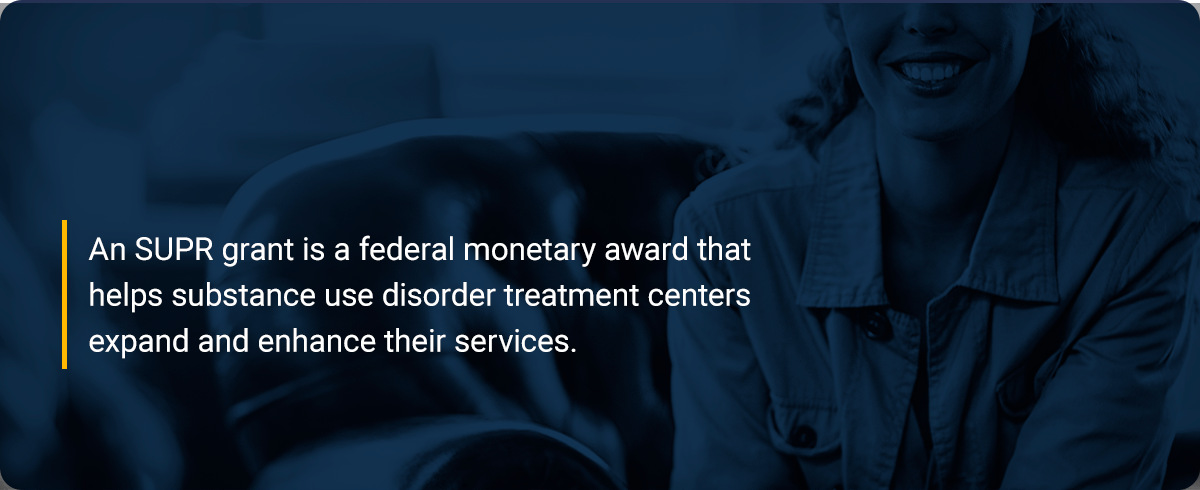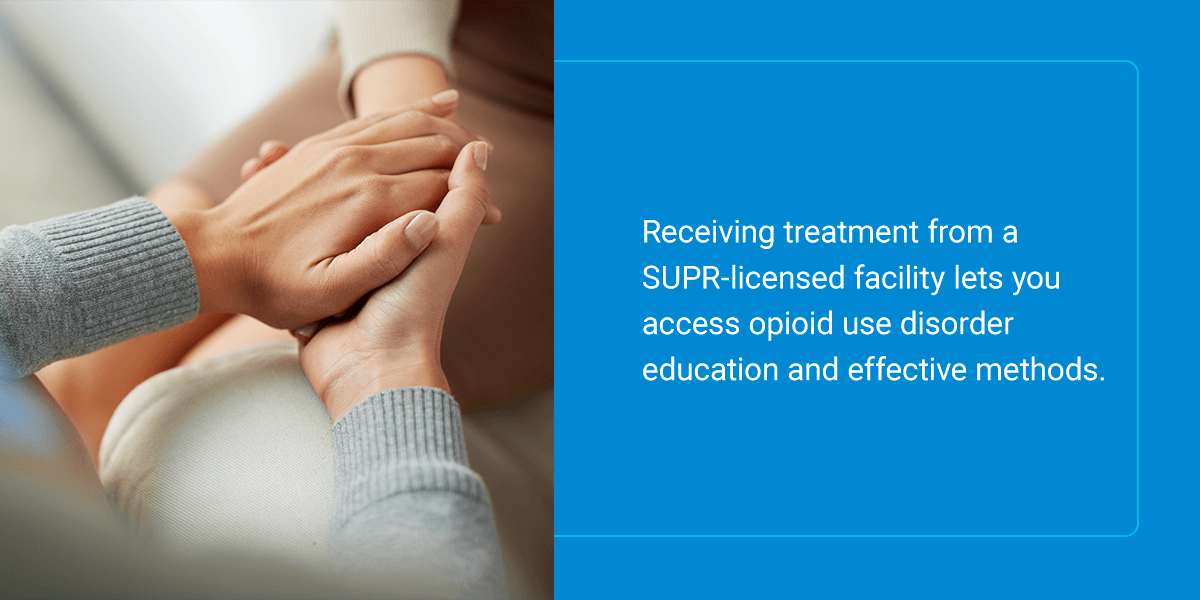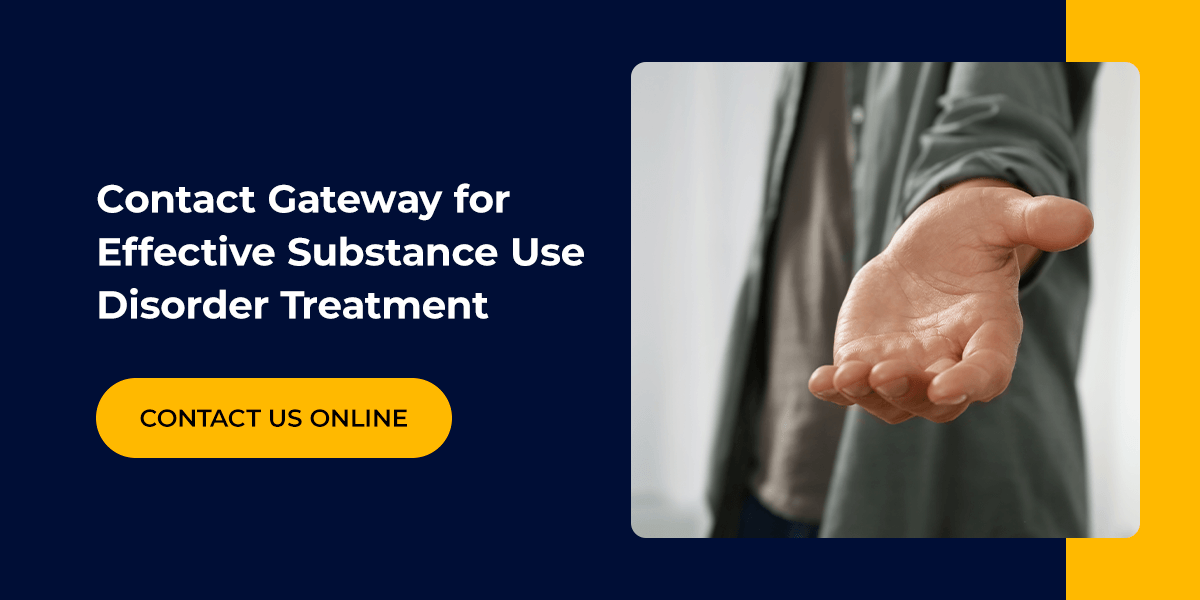- Jan 22
- Recovery
The Substance Use Prevention and Recovery (SUPR) division of the Illinois Department of Human Services (IDHS) provides funds for qualified treatment and recovery support centers. Thanks to SUPR grants, Illinois can expand and improve its substance use disorder treatment efforts.
Receiving treatment from a SUPR-funded treatment center lets individuals work toward recovery with evidence-based methods, plentiful resources, and medical and professional support. The SUPR division and its grants aim to help address the state’s opioid crisis and help citizens experiencing addiction. With SUPR, Illinois hopes to reduce substance use and overdoses.
Importance of the SUPR Division
The IDHS provides important services for Illinois residents, and it delegates substance use and recovery-related responsibilities to the SUPR division. This division benefits Illinois communities because it strives to help people recover without stigma and discrimination. SUPR provides the following services for citizens who experience substance use disorders and harmful behavioral fixations:
- Prevention
- Intervention
- Treatment
- Recovery support
SUPR treats at-risk individuals, people with substance use disorders, and those in recovery with dignity, eliminating barriers to recovery. This division develops, monitors, evaluates, and maintains a statewide recovery-focused care system, and federal and state funds help it provide essential services. SUPR contracts various community-based treatment organizations to provide the following services to populations and communities with substance use disorder and recovery needs:
- Substance use disorder screening and assessments
- Patient-treatment matching
- Treatment referrals
- Interventions
- Substance use disorder treatment
- Continuing care services
What Is a SUPR Grant?
An SUPR grant is a federal monetary award that helps substance use disorder treatment centers expand and enhance their services. Treatment centers may use SUPR grants to expand their facilities, make their facilities more accessible, hire new staff, obtain quality equipment and supplies, or offer more services.
The United States Substance Abuse and Mental Health Services Administration (SAMHSA) has awarded over $110 million to the IDHS SUPR division since September 2016. These funds support programs in the form of four grants, and these federal awards help grant-supported programs provide quality services.
What Are the Requirements for a Facility to Receive SUPR Grant Funding?
Facilities must meet the following requirements to receive SUPR grant funding:
Authorized Organization Representative
Each organization must designate a management authority figure. This individual manages, controls, and uses SUPR funds appropriately and according to the contract. The same management authority figure should handle each grant agreement and fulfill the following duties:
- Serve as the point of contact for communication involving the grant agreement
- Work with program staff assigned to handle programmatic challenges
- Sharing information from SUPR, such as news alerts, training opportunities, and policy adjustments, with the appropriate staff
An organization must inform SUPR in writing within 10 calendar days if it designates a new authorized organization representative.
Patient and Staff Overdose Prevention Training
Treatment organizations must train their professional and support staff on how to recognize and respond to an opioid overdose. Each staff member within an organization must receive education and training about naloxone during new employee orientation and have access to the medication at all times. This medication is capable of reversing an opioid overdose, and it can save an individual’s life.
Substance use disorder treatment organizations must also provide information about opioid overdoses to patients who enter or seek treatment. This information must cover the following information:
- Medication use for an opioid use disorder
- How to recognize and respond to an opioid overdose
- How to administer naloxone
Facilities receiving naloxone from Overdose Education and Naloxone Distribution (OEND) organizations can register as OEND sites. SUPR encourages organizations to enroll as Drug Overdose Prevention Programs (DOPPs) if they distribute naloxone to patients. If an organization registers as an OEND program through DOPP, it can increase training and informational resources for local municipalities, residents, and loved ones of individuals with an opioid use disorder.
Proper Financial Management Procedures
Each organization must meet the proper Code of Federal Regulations (CFR) fund control standards and provide a written financial management procedure outlining its process for meeting these standards. Organizations must also provide the requirements for requesting advance grant agreement funds in their written procedures.
Proper Capacity Management
Programs must maintain proper capacity management using the Capacity Management (CapMan) system. Organizations can access this program on the provider portal website through the Illinois Helpline.
Closure or Relocation Approval
If a funded organization plans to close or relocate, the program must request and receive approval at least 90 calendar days before closing or relocating. The SUPR can approve or disapprove a relocation or closure request and may ask an organization to return payments originally intended for the closing or relocating service.
Understanding of State and Federal Regulations
Substance use disorder treatment organizations must complete an Annual Online Certification Plan Survey (CPS) to prove they receive and understand the following regulations and requirements:
- State and federal regulations applicable to the grant contract award
- Terms and conditions in the grant agreement and exhibits
- SUPR attachment C details and service requirements
All organizations other than substance use prevention-only programs must complete the FY CPS for the year they apply for. SUPR staff may also perform on-site verification.
Contract Adjustment
SUPR may ask an organization to revise its Uniform Grant Budget (UGB). If an organization receives this request, it must submit its revised budget within 45 calendar days so the SUPR can review and approve it. If the organization does not send the revision within the appropriate time, SUPR may void it.
Charitable Choice Registration
Charitable or religious organizations must register in the Illinois Attorney General Charitable Trust Database. Organizations can register by providing written procedures and policies about CFR Title 42 requirements. A 42 CFR Part 2 program must adhere to specific confidentiality and consent requirements.
The Benefits of Treatment At a SUPR Treatment Center
Seeking treatment at a SUPR grant-funded treatment center offers the following benefits:
Quality Support
Substance use disorder treatment centers must adhere to strict regulations to qualify for SUPR grants. You can trust a SUPR-funded facility to offer high-quality, evidence-based treatment. SUPR awards funds to facilities that employ experienced staff and provide programs that comply with state and federal regulations.
Personalized Treatment
SUPR-licensed treatment centers provide personalized treatment tailored to individual needs. When you receive treatment from a SUPR-funded organization, you can gradually transition from one care level to another through a continuum treatment approach. This approach allows staff to assess your needs and provide the medical and professional care that best supports your lifelong recovery.
An initial assessment helps determine the best care level for you based on the American Society of Addiction Medicine’s (ASAM) criteria. Various care levels, such as outpatient treatment, residential inpatient treatment, withdrawal management services, and recovery aftercare, support individuals in different stages of recovery.
Effective Opioid Overdose Prevention
A SUPR-funded treatment center has the staff and resources to treat opioid use disorder and prevent overdoses effectively. Receiving treatment from a SUPR-licensed facility lets you access opioid use disorder education and effective methods such as medication-assisted treatment (MAT) programs.
Sobriety Support
You can receive ongoing support, treatment, and resources from a SUPR-funded treatment center. SUPR-licensed organizations offer recovery housing, sobriety-based groups and recreational activities, aftercare programs, and intermittent staff support to help individuals maintain sobriety following treatment.
Various Treatment Methods
Seeking help from a SUPR-licensed treatment center lets you receive the type of treatment that works best for you. SUPR does not endorse any particular treatment method, so SUPR-funded programs are free to provide various evidence-based treatments and determine the best methods based on patient needs. If a 12-step program or medication-assisted treatment doesn’t work for you, you can pursue other options, such as cognitive behavioral therapy, group therapy, or a combination of multiple treatments.
Questions to Ask During Admission
The admission process is an opportunity to express your needs before starting treatment. Asking questions can help you understand your options, how treatment works, and how you can reach your goals. Ask the following questions to advocate for yourself and learn what to expect in available programs:
What Kind of Professionals Will Be Providing Treatment?
Every individual is different, and treatment plans vary according to your goals and needs. Ask if your care plan will include one or more of the following professionals:
- Psychiatrists
- Physicians
- Nurses
- Counselors
- Therapists
Does Funding Cover Patient Costs for Treatment?
The goal of a SUPR grant is to help facilities expand and improve the services they provide, making effective treatment more widely available and eliminating possible barriers to entry. Contact yofur treatment facility to learn more about how funding affects patient costs and to discuss available options.
Does the Treatment Center Mandate Specific Treatment Models?
Since SUPR does not endorse a specific type of treatment, it’s important to ask an organization about the programs they offer. For example, you may seek a religious treatment model incorporating your beliefs in treatment or prefer a secular program unaffiliated with religion. You may want to try a specific type of talk therapy, such as cognitive behavior therapy, an evidence-based curriculum, such as 12-step facilitation, or both.
Asking a treatment center about their available programs allows you to pursue the recovery path that’s right for you. It’s best to seek a program offering a wide variety of treatments and services.
What Does the Initial Assessment Cover?
Initial assessments help treatment centers determine the best course of treatment, so choosing a program with a thorough assessment process is important. Before entering a treatment program, ask the center what their assessment covers. The most effective programs carefully evaluate physical and psychological factors to address co-occurring conditions and help patients reach their long-term recovery goals.
How Much Ongoing Support Does the Treatment Center Provide?
Substance use disorder is a chronic condition that often requires lifelong support. Choosing a recovery center with quality aftercare and ongoing support programs is essential. Before enrolling in a treatment center, ask how much support is available after completing the recovery program.
How Long Does Treatment Last?
Asking treatment centers how long their programs last is also important. Remaining in a program until you feel ready to re-enter the world outside of treatment allows you to receive the support you need for long-term sobriety. When considering a treatment center, ask how long its recovery programs last and if you can stay longer if you need additional time.
What Type of Medical Treatment Is Available?
Some individuals experience intense withdrawal symptoms when they begin treatment, so choosing a program with quality medical care is important. Before entering treatment, ask program staff what type of medical treatment they provide. Some programs offer MAT programs and withdrawal management services to ensure individuals remain safe during recovery.
How Gateway Foundation Uses State Funding to Improve Substance Use Disorder Treatment
Gateway Foundation is Illinois’ leading nonprofit treatment program specializing in substance use disorder and co-occurring conditions. Gateway uses state grants to improve its services and make substance use disorder treatment available to more people. For example, Gateway Foundation’s Kedzie Recovery Home received funding in 2022 to increase its accessibility to individuals with physical disabilities. The Kedzie Recovery Home used this funding to make structural changes, add an elevator, and improve its kitchen, common area, and food service resources.
Gateway Foundation’s Aurora addiction counseling facility also benefitted from state funding in 2022, allowing it to build recovery housing for individuals recovering from substance use disorders. This funding allowed the program to construct a 32-bed recovery house, adding more space and resources to the existing 44-bed residential treatment facility.
While state funding allows Gateway Foundation to expand its facilities and offer excellent services, individuals can also expect effective treatment because of Gateway’s following awards, affiliations, and recognitions:
- National Association of Addiction Treatment Providers
- Joint Commission International for Quality Approval
- National Council for Mental Wellbeing
- FoRSE Treatment Outcomes Program
- LegitScript
- Top Performer in LGBTQ Healthcare Equality
- Substance Abuse and Mental Health Services Administration
- NALGAP
- National Council for Mental Wellbeing
Benefits of Receiving Treatment From Gateway Foundation
Substance use disorder requires evidence-based treatment and support, and Gateway Foundation strives to provide the most effective resources for people experiencing addiction. You can expect the following benefits when you seek treatment from Gateway Foundation:
Treatment From Qualified, Compassionate Staff
Gateway Foundation hires the most experienced, compassionate, and qualified individuals to serve those who come through our doors seeking help.
Our clinical team consists of psychiatrists, therapists, physicians, nurses, counselors and other medical professionals to serve all types of treatment. Our evidence-based expertise lets us assist with dual diagnosis, trauma, residential and outpatient care, specialized programs, and other modalities to suit your unique needs.
We strive to support each individual with personalized treatment and respect, ensuring we address their deepest needs and co-occurring conditions.
Several Treatment Options
A treatment that helps one individual may be ineffective for the next. Gateway Foundation implements many different treatment programs and methods to ensure patients have options.
We offer various talk therapies, withdrawal management, sober living, group therapy, inpatient and outpatient programs, and medical treatments to help people find the method that works best for them. Our medication-assisted program uses medicines such as Suboxone to help individuals recover from opioid use, reducing withdrawal symptoms.
Thorough Assessment
Gateway Foundation thoroughly assesses each individual seeking treatment to ensure we offer the best support possible. Our care coordinators guide each individual through a fast and easy assessment. When you contact Gateway Foundation, you can confidently communicate your needs and experiences, learn about the most beneficial programs and treatments, and discuss your insurance options.
Contact Gateway for Effective Substance Use Disorder Treatment
Illinois strives to improve the opioid crisis and other substance use challenges. Through state funding such as SUPR grants, treatment centers are able to enhance their services and expand recovery resources to more people. Gateway Foundation offers evidence-based treatment methods, thorough assessments, and experienced staff to address individual needs and help people break free from substance use disorder.
Whether you respond better to medication-assisted treatment, 12-step facilitation, talk therapy, or a combination of treatments, Gateway can help you reach your recovery goals. Contact Gateway Foundation online to learn more about our services and how we can help.





